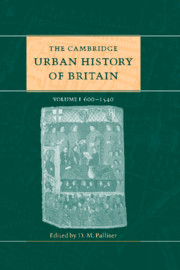1 - Introduction
from Part I - Introductory
Published online by Cambridge University Press: 28 March 2008
Summary
The history of British towns is a very distinctive one in a European – even in a world – perspective. Until the eighteenth century most of them were small by international standards, yet in the nineteenth century Britain became the first country in the world to urbanise, that is, to have more than half of its population living in towns. The divide is neatly measured by the 1851 census, which showed (depending on urban definitions and boundaries) about 54 per cent of English and Welsh people, and 52 per cent of Scots, town dwellers. No one, therefore, questions the importance of British towns and urbanisation in the last two centuries, and it is indeed possible to write British history since 1850 from an urban point of view. For the pre-industrial period the subject has understandably seemed less important, since though southern Britain at least has had towns for most of the last two millennia, for much of that long period they were relatively small: relative, that is, both to contemporary continental cities, and to modern towns. Visitors from Venice judged late medieval London to be the only important British city, while Patrick Collinson has described Tudor towns (other than London) as ‘small-scale Toytowns and Trumptons’ compared to the great imperial cities of Germany and the Netherlands.
- Type
- Chapter
- Information
- The Cambridge Urban History of Britain , pp. 1 - 16Publisher: Cambridge University PressPrint publication year: 2000
References
- 1
- Cited by

